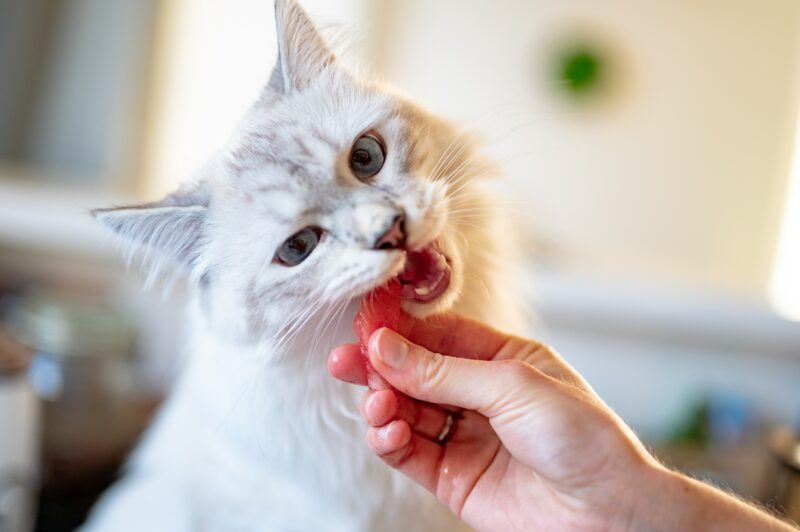Just like bones to dogs, cats are also often portrayed in TV shows munching and going crazy over fish. Which makes us wonder, do cats really love fish or is it just another stereotype that we cat owners just got used to? Find out more about your feline friend and their favorite swimming buddies.
The truth behind your kitty’s love for fish is the smell. They are actually attracted to the strong smell that fish gives off. Since cats have a very sensitive sense of smell, the second that they smell the aroma, excitement levels instantly shoot up.
What Are The Nutritional Benefits of Fish for Cats?
Fish, particularly fatty fish like salmon, mackerel, or tuna, offers several nutritional advantages for cats when included in their diet in moderation.
- Omega-3 Fatty Acids – Fatty fish are rich in omega-3 fatty acids, which contribute to a healthy skin and fur, supportive cognitive function, and may have anti-inflammatory properties.
- Protein Source – Fish is a high-quality source of protein, essential for muscle development, maintenance, and overall feline well-being
- Vitamins and Minerals – Fish contains various vitamins and minerals, including vitamin D, iodine, and selenium, which play crucial roles in bone health, thyroid function, and overall immunity.
Despite all these nutritional benefits, it is crucial to approach feeding fish to your pet felines with a balanced perspective, considering both the positive and potential drawback. It is also important to take note that not all fish have the same nutritional content. Some fish types are healthier than the others.
What Are The Potential Risks of Fish Consumption in Cats?
- Thiamine Deficiency – When raw fish is fed in excess, it can lead to thiamine deficiency in cats. Thiamine is essential for nerve function, and its deficiency can result in neurological issues such as fairly rapid onset of impaired vision, dilated pupils, and ataxia.
- Mercury and Contaminants – Fish, especially larger species, may contain elevated levels of mercury and other environmental contaminants. Prolonged exposure to these substances can pose health risks to your feline friends.
- Bacterial and Parasitic Infections – A domestic cat’s digestive system is not built for processing fish. So, it is never advisable to feed them raw fish. Raw or undercooked fish may carry bacteria or parasites, such as Salmonella or Anisakis, which can lead to gastrointestinal issues or more severe infections in cats.
- Bone Hazards – Fish bones, especially those small and sharp ones, can pose a choking hazard or cause internal injuries to your kitty’s digestive tract when ingested.
- Fish Allergy – Ever heard of fish allergy in cats? Fish is a common food allergen for cats. According to PetMd, fish is also responsible for a large percentage of food allergies in cats. In one study of 56 cats with identifiable food allergies, fish was a responsible ingredient in 13 (23%) of those cases. This puts fish in third place for potential allergic reactions behind only beef and dairy products.
How Can I Safely Feed Fish to my Pet Cat?

- Cooked and Boneless – When offering fish to your pet kitty, the safest way to serve it is cooked and boneless. Cooking eliminates potential parasites and reduces the risk of thiamine deficiency associated with raw fish. Contrary to what tv shows show us, fish bones can cause harm to your feline friend. Remove all bones from fish before offering it to your kitty, as the bones can cause splinter and harm.
- Moderation is Key – While fish can be a nutritious addition to your tabby’s diet, it should be offered in moderation. A diet overly reliant on fish may lead to nutritional imbalances.
- Variety in Protein Sources – Ensure a balanced diet by incorporating a variety of protein sources. Cats are obligate carnivores, and a diverse diet helps meet their nutritional needs.
- Avoid Seasonings and Additives – When preparing fish for feline friends, avoid adding seasonings, spices, or any other additives. Cats have sensitive palates, and these additives may not be well-tolerated.
What Types of Fish can I Feed my Pet Cat?
As mentioned earlier, feeding your feline friend cooked fish is the best way to go. This list consists of cooked fish that are best and safe for your pet kitty.
- Salmon – Salmon offers a variety of health benefits such as immune boost, weight management, metabolism support, and skin health.
- Sardines – Sardines are packed with omega-3s, vitamin B12, protein, and fatty acids. Fatty acids can help brain development and keep the immune system strong.
- Anchovies – Anchovies are a great source of healthy fats. They contain less mercury and other toxins compared with other fish. However, they can contribute to feline weight gain, so make sure to rinse and drain the anchovies to remove excess fat and salt.
Do Cats Really Eat Fishbones?

Despite seeing cats on tv shows munch on fish and fishbones, it’s actually not true and one of the most common misunderstandings when it comes to the feline diet.
Fishbones are actually dangerous and may cause choking and other problems to our feline friends. The needle-like spines of the fish can get caught in their throat and stomach. This can then cause internal bleeding, and blockages.
So, should you feed your tabby some fish? Yes, of course you can! As long as it’s not raw and the fishbones are removed. Remember, a fish-only diet is not recommended for your feline friend. According to Dr. Jean Hofve, a veterinarian, up to 15% of your cat’s total diet can be added to protein such as fish.
As pet owners our fur babies will always be our responsibility. Being careful of what your cat can and cannot eat is essential to their health. Don’t hesitate to ask your vet if you have anything new to add to your fur baby’s diet.


